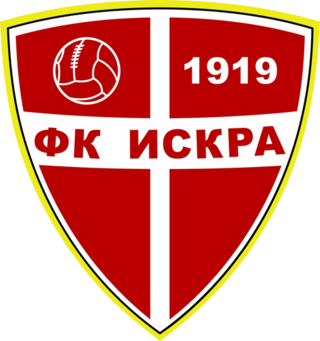External links
Computer systems from Slovenia | |
|---|---|
| 1980‑2000 | |
| 1960‑1979 | |
| See also |
|
| | This computer hardware article is a stub. You can help Wikipedia by expanding it. |
Iskra Delta 800 was a PDP-11/34-compatible computer developed by Iskra Delta in 1984.
Bresenham's line algorithm is a line drawing algorithm that determines the points of an n-dimensional raster that should be selected in order to form a close approximation to a straight line between two points. It is commonly used to draw line primitives in a bitmap image, as it uses only integer addition, subtraction, and bit shifting, all of which are very cheap operations in historically common computer architectures. It is an incremental error algorithm, and one of the earliest algorithms developed in the field of computer graphics. An extension to the original algorithm called the midpoint circle algorithm may be used for drawing circles.
In bioinformatics, neighbor joining is a bottom-up (agglomerative) clustering method for the creation of phylogenetic trees, created by Naruya Saitou and Masatoshi Nei in 1987. Usually based on DNA or protein sequence data, the algorithm requires knowledge of the distance between each pair of taxa to create the phylogenetic tree.
In gauge theory and mathematical physics, a topological quantum field theory is a quantum field theory which computes topological invariants.

In the theory of computation, a branch of theoretical computer science, a deterministic finite automaton (DFA)—also known as deterministic finite acceptor (DFA), deterministic finite-state machine (DFSM), or deterministic finite-state automaton (DFSA)—is a finite-state machine that accepts or rejects a given string of symbols, by running through a state sequence uniquely determined by the string. Deterministic refers to the uniqueness of the computation run. In search of the simplest models to capture finite-state machines, Warren McCulloch and Walter Pitts were among the first researchers to introduce a concept similar to finite automata in 1943.

The PZL TS-11 Iskra is a Polish jet trainer, developed and manufactured by aircraft company PZL-Mielec. It was used by the air forces of Poland and India. It is notable as being the first domestically developed jet aircraft to be produced by Poland, its service for over 50 years as the principal training aircraft of the Polish Air Force, and at the time of its retirement was the oldest jet-propelled aircraft still in service in Poland.
Iskra was a 1900–1905 communist newspaper. The word means "spark" in many Slavic languages.
Delta commonly refers to:

The Socialist Federal Republic of Yugoslavia (SFRY) was a socialist country that existed in the second half of the 20th century. Being socialist meant that strict technology import rules and regulations shaped the development of computer history in the country, unlike in the Western world. However, since it was a non-aligned country, it had no ties to the Soviet Bloc either. One of the major ideas contributing to the development of any technology in SFRY was the apparent need to be independent of foreign suppliers for spare parts, fueling domestic computer development.

Iskra Delta Partner was a computer developed by Iskra Delta in 1983.

Iskra Delta was a computer manufacturer from Slovenia, and one of the biggest computer producers in SFR Yugoslavia that saw its own end with the breakup of the country. It started in 1974 as Elektrotehna, the Ljubljana representative of Digital Equipment Corporation, a USA minicomputer manufacturer with an office in Belgrade. It began assembling PDP-11 minicomputers in Ljubljana from DEC processors and Ampex disks in 1978. Rapid expansion over all major Yugoslav Republics. It had a joint venture with Energoinvest, Sarajevo. Video terminals' assembly was in Paka, Slovenj Gradec. Forced merger with Iskra and Gorenje computer divisions resulted in Iskra-Delta's enlargement to 2,000 employees. Delays with microcomputer technology and freer import brought its collapse in 1988.
YUSCII is an informal name for several JUS standards for 7-bit character encoding. These include:

Triglav was a computer from Slovenia developed in the 1980s and manufactured by Iskra Delta. It came to the market in 1985. It had options for three different central processing units and could therefore run several different operating systems that were popular at the time. Also supported was a hard drive with a capacity between 40 and 80 MB, 5.25" floppy drive and a microstreamer tape drive.
A quantum Turing machine (QTM) or universal quantum computer is an abstract machine used to model the effects of a quantum computer. It provides a simple model that captures all of the power of quantum computation—that is, any quantum algorithm can be expressed formally as a particular quantum Turing machine. However, the computationally equivalent quantum circuit is a more common model.
ISKRA lasers are short pulse lasers which were built by the Soviet Union at RFNC-VNIIEF in Arzamas-16 (Арзама́с-16) with the approximately 2 kJ output ISKRA-4 laser being completed in 1979 and the 30 kJ output ISKRA-5 laser which was completed in 1989.

The Iskra 1030 was an Intel 8086 compatible personal computer produced in the USSR. It was designed by Elektronmash in Leningrad. The main manufacturers were the Iskra factory in Smolensk and the Shchyotmash factory in Kursk. The model line consisted of Iskra 1030.11 (basic), Iskra 1030М (modified), Iskra 1031, and Iskra 3104.

Iskra is a Slovenian company for electromechanics, telecommunications, electronics and automation.

Kristall Saratov is an ice hockey team in Saratov, Russia. They play in the VHL-B, the third level of Russian ice hockey.

Fudbalski klub Iskra is a Montenegrin football club based in Danilovgrad. They currently compete in the Montenegrin Second League.
In computational neuroscience, SUPS or formerly CUPS is a measure of a neuronal network performance, useful in fields of neuroscience, cognitive science, artificial intelligence, and computer science.

The Computer History Museum Slovenia is a museum in Slovenia dedicated to preserving the history of computing and digital heritage. Highlighting computer artifacts tied to global computer history, the museum also presents a substantial collection of items linked to early Yugoslav and Slovene computer systems.